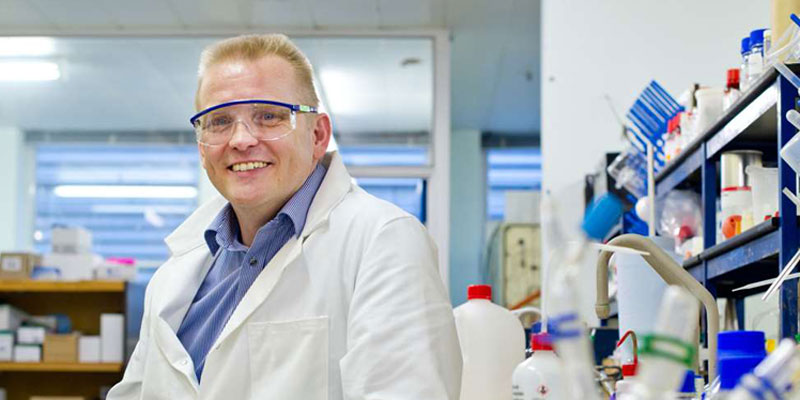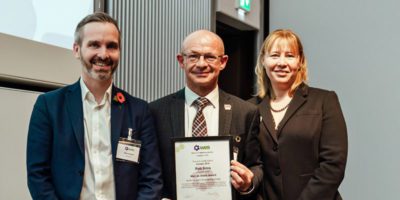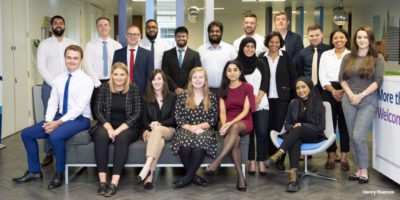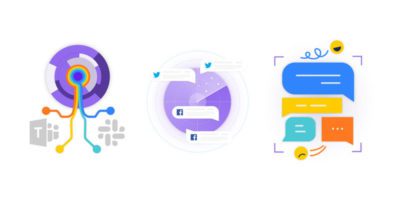Professor Tom Welton OBE is a professor of sustainable chemistry at Imperial College London, and his research focuses on ionic liquids and on solvent effects in chemical reactions. Serving as head of the Department of Chemistry from 2007 to 2014 and as dean of the Faculty of Natural Sciences from 2015 to 2019, he is a fellow and the current president of the Royal Society of Chemistry. Tom is a member of the UKRI Equality, Diversity and Inclusion External Advisory Group, advocating for greater visibility for members of the LGBT community and other underrepresented groups in the sciences.
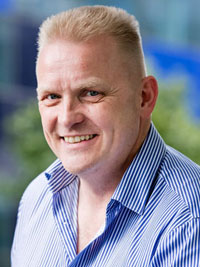
“You’re not the only person who’s going to have ideas, and your ideas come from your experiences, and other people’s ideas come from their experiences. Sometimes they’re the one that you need to be listening to, as they’re the one who’s had the best idea. It really is as simple as that.”
I love chemistry
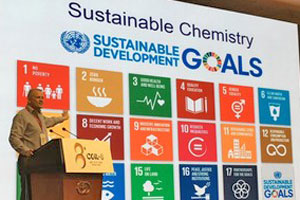
I grew up in North London. Whenever you say you grew up on a council of estate people somehow imagine you grew up in a war zone. Not true. There were lots of open green places to play. It was lovely.
I went to the University of Sussex, down in Brighton, which worked out very well both educationally, because it was a fantastic department to be in, and also socially, because it was Brighton and I was a young gay man. People have now seen It’s a Sin (on Channel 4), and it was during that period that I was a student. Brighton was one of three towns in the world, where it was safe as a gay man to walk down the street, hand in hand with your partner.
I did my PhD there, did a little skip over to Exeter for a couple of years to do a temporary job there, and then I came to Imperial College, where I’ve been ever since. I do my own research and teaching, but I also became head of the Department of Chemistry, and then dean of the Faculty of Natural Sciences.
If you’re not quite sure what a dean is, if the head of department is the shop manager, then the dean is the area manager. I stopped that just before lockdown to make space for my current role outside Imperial College, which is president of the Royal Society of Chemistry, which is an amazing job.
I’m also a member of UK Research and Innovation’s Diversity, Inclusion and External Advisory Group and I’m on the Elsevier Inclusion and Diversity Advisory Board as well. They both give you the opportunity to broaden your influence and to also to work with wonderful people. On advisory boards, you aren’t executives, you don’t decide what happens, but what you do is give your advice. “There are some things that people have found to work here.” “Hang on, have you noticed that?” That kind of thing.
Impact of COVID-19
When I look around the rest of the world, I feel blessed how little COVID has affected me. No one I know closely has died. I’m incredibly fortunate, although we’re now in this very strange world, where most days I commute from my bedroom to my kitchen table.
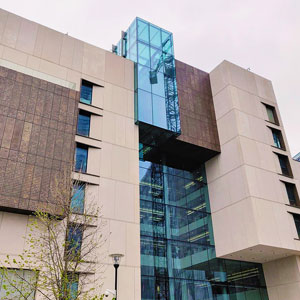
I do get to go into work as well. One of the things that happened since 2016 at Imperial is that we’ve got a magnificent new building for the Chemistry Department, which we call the Molecular Sciences Research Hub.
In our old building, we had lots of little corridors, tiny rooms, so it would have been very, very difficult to pandemic-proof that building, whereas in contrast, the new building is big with open spaces and it doesn’t have any corridors at all. In fact, we have five changes of air every hour, because it’s a high-tech chemistry space, so it’s probably the safest place I go to. It couldn’t have been better designed for COVID.
We’ve been working throughout – because it’s research we were allowed to come in even during lockdown. We were working on a two-cohort model, so, one week, half the department come in, and then the next week, the other half of the department came in. There were some students I saw every fortnight in real life and there were other students I never saw.
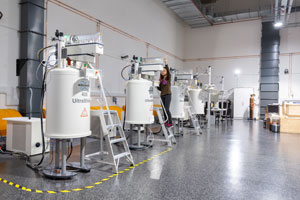
When I’m at work, I meet with my research group, we sit more than two metres distance, apart. We chat about how their research is going, what they’re doing, what they intend to do, and what we think would be the best next step.
Becoming president of the Royal Society of Chemistry
When it comes to the presidency of the Royal Society of Chemistry, there’s a huge variety of things that I do. Literally no two days are the same. I might be giving a schools’ lecture or I might be at a high-level academic conference. I go to government meetings, UN meetings, so all sorts of amazing stuff.
At the moment with the UN, we’re trying to develop how they’re going to build their scientific advisory network, for their strategy on dealing with chemicals and pollutants. We’re trying to help them develop that based on the best available science. It’s an incredible variety of things to do. Literally, you might be doing that one minute and then next minute, you’re talking to a bunch of school kids! It’s a wonderful thing.
With the presidency, strangely, I’ve done more events, because you don’t have to do the travelling bit. It used to be that you’re going off to some event and it takes you a day to get there, you have to stay overnight, because it’s so far away, and then it takes you a day to get back. Whereas now it only takes an hour or two or however long the event is because you’re doing it from your kitchen table.
There was one day a couple of months ago, where first thing in the morning, I was in Australia, then I went to India, then I was in Brussels, then I was here. And then I was in America, and this was all in the same day. You just could not do that in real life.
Diversity is the statistic; inclusion is the thing you do
At the Royal Society of Chemistry, we write great reports, describing the situation, and we’ve done that for 20 odd years, but the really important thing is, what do you actually do? Diversity is the statistic, whereas inclusion is the thing you do. That’s why it’s important to me, because it’s all about doing stuff.
Inclusion is the thing that anyone can do. It doesn’t matter whether you have some big job, being the boss of some organisation, or you could be someone who’s daily job is coming in, sitting at a desk doing some more operational work. In either role you can also think about what you can do to make the place more inclusive. I often talk about reach. So, I’m very lucky, I have a long reach, I’m doing a high-profile job at the Royal Society of Chemistry, I meet lots of people, so I am able to influence a lot of stuff. I have a long reach.
Some people just reach the others they meet immediately around them, but they’ve still got a reach, and they can still be more inclusive within that reach. That’s why I champion it so much because it is the thing that we can all do to make things better for others.
We’re all multi-dimensional human beings
Intersectionality is one of the words I find a little bit difficult. The word ‘intersectional’ just makes me think: “Oh, God, I’m not a traffic junction!” But what ‘intersectional’ means is that we’re all multi-dimensional human beings, we’re not just one thing. The intersection is where those different parts of us meet.

In my last Womanthology article I mentioned how I didn’t like The List – which is what I call the list of gender, race, disability, sexual identity, socioeconomic background and so on… So, in a sense, intersectionality means that you can’t just frame everything around this list. What you have to do is to treat people as whole human beings. Everybody needs to be treated fairly with respect and compassion.
You can’t say: “I’m including you,” to one person but “I’m not including you,” to another, because that’s not being inclusive, and so intersectionality is important, because it recognises people for who they actually are. You meet lots of people who will say, “I don’t want to be defined by one aspect of who I am,” so it also welcomes them on board, to this world of inclusion and diversity.
Your ideas come from your experiences
I’ve got one set of experiences and one brain in my head that has been through the world in a particular way. I’m a chemist, and although chemists can do wonderful things, sometimes you need people with other educational experiences, but also other life experiences.
There will be times, and we’ve all done it, where you listen to someone describing their life, and you just go: “Oh, I’ve never thought of it like that.” And if that happens, it doesn’t mean you’re an evil, nasty person, it just means that you’ve had the experiences that you had. That’s why we need those different points of views, to raise what the issues are. I don’t see every issue because I don’t experience every issue, and so I need to be told about these things in order to understand them better.
You’re not the only person who’s going to have ideas, and your ideas come from your experiences, and other people’s ideas come from their experiences. Sometimes they’re the one that you need to be listening to, as they’re the one who’s had the best idea. It really is as simple as that.
Athena SWAN transformed
Last week, Athena SWAN launched what they called their transformed UK Charter. Last time we spoke their diversity charter was growing. First, it was just about science, engineering, and medicine, but then it became about ALL subjects. More people were joining up to it and it exploded, spreading across the world.
What you had to do for an application wasn’t appropriate anymore. I do Athena SWAN reviewing and the amount of time that it took to review, let alone write, one application was basically a day’s work. By the time you’re having hundreds and hundreds and hundreds of these things coming in each time, it became impractical.
In the new format it’s much more, “Here are the criteria, show us how you meet these criteria,” rather than: “Tell us all about yourself.” So, it’s clearer what’s required, because when they were first starting out on the Athena SWAN journey, people found it very difficult to work out what it was that they need to say, so they’re cleaning up the application process.
Conversely, they don’t want applicants to feel there’s a formula that you have to repeat again, and again, and again. It’s about telling them how things work in your own context, because your context is different to someone else’s context.
We want to give people the freedom to say: “Here’s where we are, and so this is our journey.” So, in one way, it’s more freeing, but in the other way, it’s more programmatic to enable good, fair, objective judgments to be made.
Declared ally or declared enemy?
The word ‘ally’, in the context of inclusion seems a little strange to me because it suggests that if you’re not a declared ally, you’re a declared enemy, and I don’t think that’s the reality of the situation.
I get asked to do a lot, “Oh, you’re a gay man, tell us about this,” but if the only diversity issues I talked about, were the ones that directly affected me, I would not be a champion of diversity inclusion, what I would be is somebody who wanted the world to be easier for me.
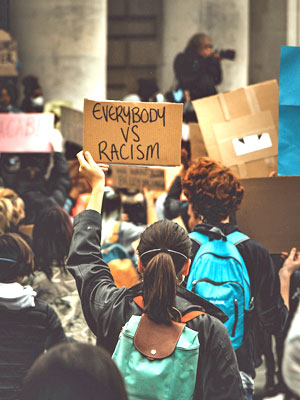
So, it matters that all of us think about all kinds of diversity, all kinds of disadvantage, and what we can do to take those disadvantages away to ease those disadvantages, because that’s what being a champion of inclusion and diversity means. Otherwise, I would just be that old queen who wants their life to be a bit better.
We are going to include you
Several years ago, I was having cancer treatment and I had one really, really good boss, Sir Richard Sykes. I was in the period when I was coming back to work. Every time I went into hospital, there would be an email from the boss of the entire university. At that time, I wasn’t even a head of department, I was a director of teaching. He had met me.
His emails would say, “I hope the chemotherapy goes well.” He was really great. He would recognise that there were times during my treatment when I had to eat at very particular times, and people in meetings would say: “Oh, well, you can just stay until till the end,” but he would intervene and say: “No, he can’t. He has to go now.”
It made such an incredible difference to my recovery to have someone who was such a supportive boss. It was also a really effective management tool, because it made me feel so much loyalty to the place as well, and to the boss, the guy who was in charge. When someone does that you realise so much more about what inclusion is. It’s about saying: “Actually we’re going to include you, and including you means helping you.”
“Have you ever thought of this..?”
I’ve got another year of the Royal Society of Chemisty presidency, so I’m looking forward to emerging into the real world. I’ve been blessed in my career. At some point somebody will say: “Oh, have you ever thought of this..?” just at the moment when I’m thinking: “Oh, what do I do next?” And then I will just say: “Oh, that sounds fun. I’ll do that.” So, I have another year of my presidency, and then hopefully, in that year, somebody will say: “Have you ever thought of this?” and I’ll have an epiphany about what happens next.
https://www.imperial.ac.uk/people/t.welton
https://twitter.com/impchemistry

